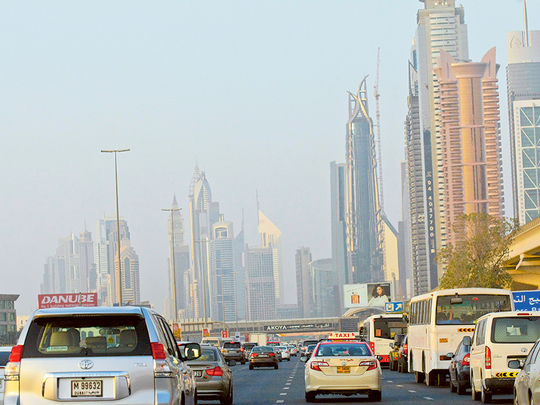
Dubai: Walid Zahra has a 25-minute trip home from his office in Dubai — if you don’t count the two hours he spends waiting at a cafe for the traffic to clear.
“I decided it’s better to spend that time reading papers than getting stressed in my car,” the 27-year-old human resources worker said.
Like about half the people who work in Dubai, Zahra, a Lebanese father of one, can’t afford to live there, requiring his commute from neighbouring Sharjah. As the roads grow increasingly clotted, the city is introducing ways to add modestly priced homes to a mix dominated by luxury villas and high-end apartments.
“We can’t just keep building wider roads, bridges and tunnels,” said Abdullah Rafia, assistant director general of engineering and planning for the municipal government. “Affordable housing is the solution to the mobility problem in Dubai.”
The issue is urgent for the UAE’s business hub, which depends on a largely foreign-born workforce to keep its economy humming.
Downside of high rents
“Rents and the high cost of living, if not addressed, will discourage future companies from relocating here,” said Martin Cooper, the Dubai-based director of Middle East real estate at Deloitte LLP.
“They need to start addressing it now, because affordability is increasingly becoming an issue even for those with relatively high income.”
Among the steps taken or under consideration, the government says developers should designate 15 per cent to 20 per cent of their projects for low-cost housing.
For now, “we are keeping it optional,” Rafia said. “After a few years, if it’s needed, we’ll go with regulations that are compulsory for everybody.”
Authorities don’t plan to build low-cost homes themselves for the time being, though they have the ability to do so, he said.
The government owns most of the undeveloped land and holds majority stakes in developers including Nakheel PJSC, Meraas Holding LLC and Dubai Property Group.
Affordable-housing targets haven’t worked elsewhere.
After the UK’s Conservative Party-led government cut direct spending on such development by 60 per cent from 2011 through 2015, the number of low-income and affordable homes completed in England fell by almost 30 per cent in fiscal 2014 from three years earlier, according to government statistics.
Rent Ratio
Colliers International, a US-based property broker, estimates that about half of Dubai’s population, excluding the lowest earners such as construction workers and maids, earns Dh9,000 to Dh15,000 ($2,450-$4,083) a month.
Based on the US ratio that rent or mortgage payments shouldn’t exceed 30 per cent of household income, housing costs should range from Dh32,500 to Dh54,000 a year.
The few areas where studio and one-bedroom apartments fall into that range for renters include International City, Dubai Silicon Oasis and Discovery Gardens, as well as parts of older Dubai such as Al Ghusais, Deira and Al Nahda.
Rents in those areas have been rising faster than in the city as a whole, according to Colliers.
Dubai apartment rents surged 18 per cent in the fourth quarter from a year earlier, while villa rents grew 5 per cent, according to a report by broker JLL Inc.
Government subsidies and lower land costs are essential to increasing affordable housing, said Matthew Green, head of UAE research at CBRE Group Inc, a Los Angeles-based commercial-property company.
The government can also push construction in bulk by providing land and asking private contractors to bid for the work, he said.
Those steps are unlikely, though.
“I don’t think we will go into those kinds of incentives,” Rafia said.
Luxury Properties
Dubai’s developers have long focused on luxury properties aimed at wealthy buyers from countries including India, Russia and the UK. That’s changing as the strength of the dollar-pegged dirham dents demand.
Home prices in the emirate fell the most in the world in the second half of last year, 6 per cent, after being the fastest growing a year earlier, according to a March 16 report by Knight Frank, a UK-based property broker.
Though developers are shifting toward lower-priced homes as luxury demand subsides, those properties will still be beyond the reach of many, according to Khalid Bin Kalban, chairman of private developer Union Properties PJSC.
“The problem is people at the lower end of the market who tend to commute are often renters who are not interested in buying homes,” Bin Kalban said. “Developers are concerned with buyers and the demand that counts is from the mid-high end of the market.”
In a city where many companies provide housing allowance for staff, the rising cost of shelter has turned into a burden. That pushed some employers, such as Emirates airlines, to build their own compounds. In 2011, the carrier bought land to build 528 homes to house its pilots.
Building affordable homes can attract real estate funds and institutional investors looking for steady income.
Strong residential rental market
Dubai’s residential rental market is “very strong and can attract investors if the right product is made available,” CBRE’s Green said.
“Mid-market homes would have demand among corporates with large requirements to house staff who work in schools, hotels, hospitals, airlines and other industries,” he said.
Zahra, who earns Dh15,000 a month and provides for a wife and an infant son, started looking at moving to Dubai as his lease neared its end. He found that he would have to pay more than double the rent, an amount that’s almost half of his annual salary.
“We really need a two-bedroom apartment because our son is growing and the extra room isn’t optional anymore,” he said. “But we decided to put up with the pain of driving and just find a bigger home in Sharjah.”











